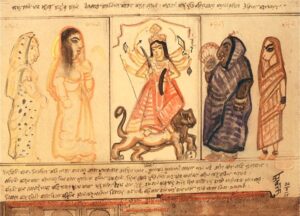Part 1
Fact is everybody’s truth. Fiction is nobody’s truth. Myth is somebody’s truth. It’s a cultural truth, a religious truth, a nation’s truth, one that binds a community together by giving them a common worldview to function within.
Science can tell you how the world functions, but only myth can tell you why it functions the way it does. The idea of God, for example, is a cultural truth: it is not part of Buddhism, Jainism, or secularism. Likewise, the idea of prophets makes no sense in the Hindu worldview. The idea of hero, villain and victim is a Greek mythic idea, which was imposed by modern storytellers on mythologies around the world, leading to distortion of cultural ideas. Equality is not a rational concept. It is a subjective truth, a belief that comes to us from Abrahamic mythology. Likewise the idea of justice comes from Greek mythology. These two Western ideas are often at loggerheads.
Of course, followers of myth believe their truth is the truth. Outsiders disagree. This is the cause of all tribal, religious, and nation-state wars. Let us explore 10 mythological stories from around the world to appreciate how different people have tried to make sense of the world.
Norse Mythology
Cost of wisdom: The story of god-king Odin and his sacrifices for spiritual growth
Odin was the king of the Aesir tribe, simultaneously god of war and earth as well as god of sky, wisdom, poetry and magic. He was shamanic, a lover of ecstasy, and trance, and often ‘effeminate’, embarrassing the Viking warriors who preferred his masculine side. One of the most striking attributes of his appearance is his single, piercing eye. His other eye socket is empty — the eye it once held was sacrificed for wisdom. He gave it up so he could drink from the well of wisdom. On another occasion, Odin hung on the world-tree Yggdrasil for nine days and nights, receiving no form of nourishment from his companions, sacrificing himself to himself, so that in the end he perceived the runes, the magically-charged ancient Germanic alphabet that was held to contain many of the greatest secrets of existence.
Odin often appears as a leader of the Wild Hunt, a ghostly procession of the dead through the winter sky. He rides a horse that has eight legs and travels with his raven and a wolf, who give him information about what is happening in every corner of the world.
From another name of Odin, Wotan, comes the name ‘Wednesday’, linked astrologically to the solid-liquid ambiguous Mercury, a planet that is somewhere in between the masculine Mars and the feminine Venus.
West African Mythology
The spider trickster: When a spirit tried to capture all the world’s wisdom
Anansi, in the form of spider, once decided to hoard the entire world’s wisdom in a pot for himself. When he succeeded, he attempted to hide the pot at the top of a tree where nobody could find it. He tied the pot in front of him and tried to climb the tree, but kept sliding and losing his grip. His son, who had followed him, suggested he tie the pot to his back so he could climb more easily. When Anansi tried to implement his son’s suggestion, the pot slipped and fell to the ground. The wisdom fell out and a sudden rainstorm washed it into the river and from there to the waters of the ocean, so that everyone in the world now owns a little bit of it.
Greek Mythology
Beauty contest that led to war: How feuding goddesses caused the Trojan War
All the Olympian gods were invited to the wedding of Peleus and Thetis except Eris, the goddess of discord. Angry, Eris decided to teach the assembled Olympians a lesson. She threw amongst them a golden apple on which was engraved the words, ‘For the most beautiful.’ Three goddesses — Hera, goddess of household, Athena, goddess of skills, and Aphrodite, goddess of beauty — claimed the apple and fought over it. No god, not even Zeus, dared judge who of the three goddesses was the most beautiful, and hence worthy of the apple. Finally, the goddesses were told to go to Paris, prince of Troy, known for his understanding of female beauty and his fair judgements. The three goddesses presented themselves to Paris and tried to impress him with their beauty. When he could not decide, each tried to bribe him secretly. Hera promised to make him ruler of the greatest kingdom in the world. Athena promised to make him the most admired warrior in the world. Aphrodite promised him the hand of Helen, the most beautiful woman in the world.
Paris accepted Aphrodite’s offer. He gave her the apple and with that, he and the land of Troy earned the enmity of Hera and Athena forever. Thus, the cause of the Trojan War was not so much human folly as it was the pettiness of the gods.




